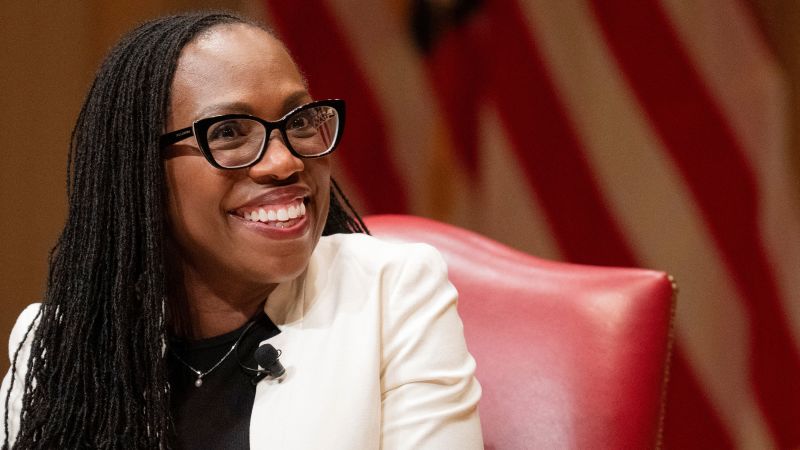In recent weeks, two notable trends have emerged at the United States Supreme Court: a consistent winning streak for former President Donald Trump and a forceful dissent from Justice Ketanji Brown Jackson, the court’s newest member. This unique dynamic was prominently displayed during a recent ruling where the court temporarily supported the Trump administration’s plan to significantly scale back the federal government’s size. Justice Jackson, a former District Court judge appointed to the Supreme Court by President Joe Biden in 2022, did not hold back in her dissenting opinion.
In her dissent, Jackson criticized the majority for allowing Trump to move forward with what she described as a “wrecking ball” approach to governance. She expressed her view that the court’s decision, allowing the administration to potentially undermine congressional authority, was both unfortunate and indicative of hubris. Jackson’s willingness to voice her concerns starkly contrasts her predecessor, Justice Stephen Breyer, who often sought to find common ground with conservatives on the court. Having recently taken up boxing as an outlet for stress relief, Jackson’s assertive approach indicates that she is unafraid to confront the court’s decisions head-on.
Her focus on the court’s handling of Trump’s policies is particularly significant. Jackson noted the haste with which the court acted, describing its decisions as lacking the caution and scrutiny that such impactful matters typically require. She accused the majority of permitting the executive branch to expand its power at the expense of Congress, suggesting that the implications of such decisions are likely to harm the general public. This dissent reflects her broader concern over the balance of power among government branches and the potential consequences for democratic governance.
The case at hand dealt with Trump’s administration’s attempts to reduce the federal footprint, an objective he prioritized during his presidential campaign. Unions challenged this approach, claiming that it infringed on Congress’s authority to establish government departments. In a succinct unsigned order, the majority of justices upheld the administration’s position, stating that only executive orders were in question and that lower courts had prematurely blocked Trump’s plans without sufficient justification.
Justice Sonia Sotomayor, while concurring with the decision, acknowledged Jackson’s issues regarding the restructuring of federal agencies. She pointed out that while the White House instituted guidelines for these reductions, it is ultimately a matter to be examined in future cases. Conversely, Justice Elena Kagan remained silent, and the division within the court on these issues continues to be palpable.
Jackson, who has quickly become one of the court’s most prolific justices, produced 24 opinions, including both majority and dissenting viewpoints, during the last term. Only Justice Clarence Thomas surpassed her productivity with 29 opinions. Some of Jackson’s dissenting writings have garnered significant public attention, revealing her willingness to challenge the prevailing views within the court.
For example, Jackson criticized a recent decision limiting lower courts’ ability to block presidential policies, framing the majority’s complicity as potentially detrimental to the rule of law. Her dissent reflected a deep disillusionment with the court’s trajectory, pointing to an erosion of respect for lower court rulings and the laws these courts interpret.
Tensions within the court were highlighted when Justice Amy Coney Barrett, aligned with a conservative majority, countered Jackson’s assertion. Barrett described Jackson’s arguments as deviating from conventional legal reasoning, indicating an undercurrent of conflict that has intensified since the court’s controversial ruling on Roe v. Wade.
Justice Jackson’s critiques gained further prominence in cases concerning civil rights, such as those involving Planned Parenthood. She articulated concerns over barriers to justice that disproportionately affect vulnerable communities in South Carolina, emphasizing the need for access to meaningful legal recourse and the preservation of civil rights protections established during the Reconstruction Era.
Overall, Justice Ketanji Brown Jackson’s role on the Supreme Court symbolizes a significant shift in the court’s balance of power and approach to social issues. Her readiness to challenge her colleagues’ decisions and advocate for the disenfranchised reflects a commitment to uphold the integrity of the judicial system and ensure that the rights of the individuals remain protected against executive overreach. The ongoing debate within the court suggests that its future decisions will continue to be shaped by the contrasting philosophies and interpretations of its members.











